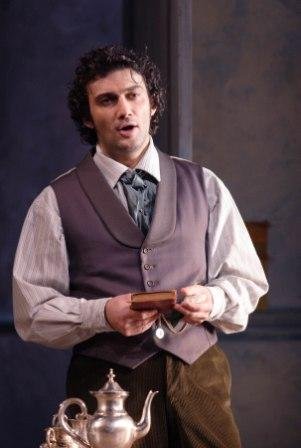|
|
|
|
|
|
|
|
| guardian.co.uk, 16 January 2008 |
| Tim Ashley |
Verdi: La traviata, Royal Opera House, 14 January 2008
|
La Traviata
|
|
|
 Truly great performances of Verdi's La
Traviata come along once in a generation, and this astonishing revival of
Richard Eyre's 1994 Royal Opera production may well go down in history as
one of the defining operatic experiences of our times. Conducted by Maurizio
Benini, it stars Anna Netrebko as Violetta, Jonas Kaufmann as Alfredo and
Dmitri Hvorostovsky as Germont. Giving three of the finest performances you
will ever see, they challenge many of our most deeply held assumptions about
this most familiar of operas. Truly great performances of Verdi's La
Traviata come along once in a generation, and this astonishing revival of
Richard Eyre's 1994 Royal Opera production may well go down in history as
one of the defining operatic experiences of our times. Conducted by Maurizio
Benini, it stars Anna Netrebko as Violetta, Jonas Kaufmann as Alfredo and
Dmitri Hvorostovsky as Germont. Giving three of the finest performances you
will ever see, they challenge many of our most deeply held assumptions about
this most familiar of operas.
Netrebko's Violetta is, first and foremost, a woman who is already mortally
ill and avid for some deep emotional experience that will give the rest of
her life meaning. Swigging champagne in an attempt to fend off coughing
fits, prone to terrifying attacks of breathlessness and emitting a
tubercular hack that makes your throat constrict with empathy, she realises
the symptoms of encroaching consumption with a veracity of which only the
greatest actors are capable. The sexual chemistry between Netrebko and
Kaufmann, meanwhile, is tangible in the physicality with which they
initially approach each other, and which tellingly persists, even at Flora's
party, when they are facing catastrophe.
Netrebko also reminds us - more vividly than any other recent interpreter -
that Violetta's tragedy is not only that she agrees to Germont's moral
demands, but that she accepts the value system of a society that deems her a
whore. When Kaufmann flings his gambling winnings at her and tells her he is
paying her off, she rubs the money over her body in a terrifying act of
self-denigration. The much-cut section of Addio del Passato, meanwhile, in
which Violetta imagines herself buried in unconsecrated ground, is restored
and tellingly becomes one of the focal points of Netrebko's interpretation.
All three, meanwhile, take colossal vocal and dramatic risks.
Netrebko's voice often blazes with warmth and opulence, though she also
deploys throttled pianissimos to convey both the ravages of disease and the
agonies of uncertainty. Hvorostovsky - stiff-backed and patrician yet
beautiful - makes morality sound horribly seductive, while Kaufmann's
often furious ardour masks a streak of sullen resentment and possessiveness.
Benini's conducting is passionately eloquent: desire flows and ebbs through
the score, as time gradually ticks away. The enthralled audience, meanwhile,
greeted each act with the standing ovation it deserved. |
|
|
|
|
|
|
|
|
|
|
|
|
|
|
|
|
|
|